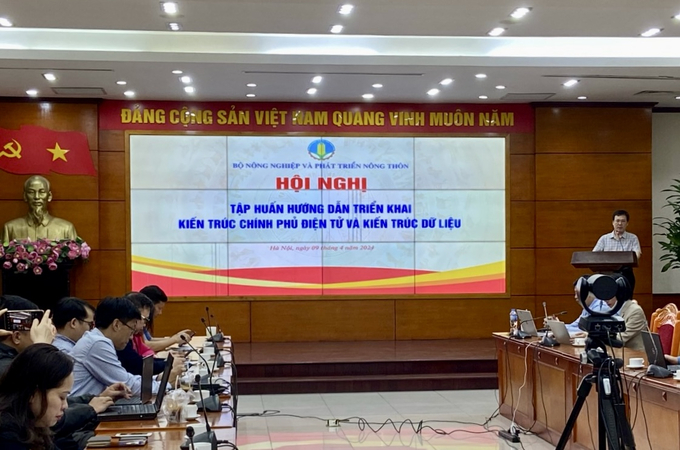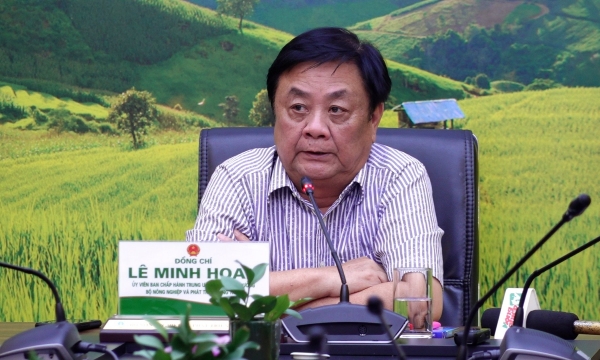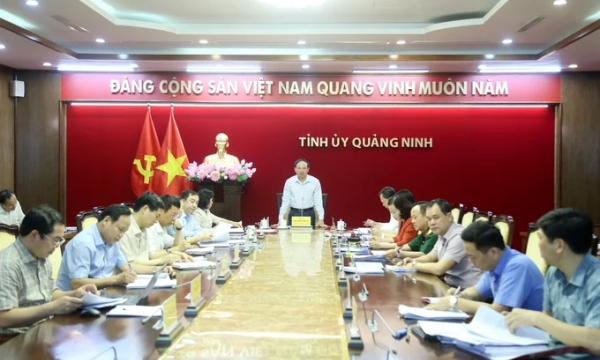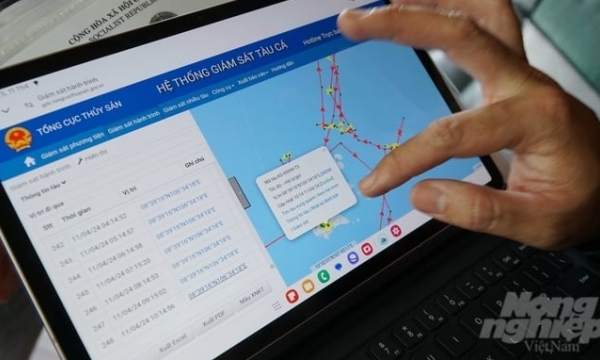April 30, 2024 | 00:35 GMT +7
April 30, 2024 | 00:35 GMT +7
Hotline: 0913.378.918
April 30, 2024 | 00:35 GMT +7
Hotline: 0913.378.918
A training conference was jointly organized by the Institute of Digital Transformation Strategy (Vietnam Digital Communications Association) and the E-Government Architecture 3.0 Team (MARD) on April 9. It aims to provide guidance on the implementation of the E-Government Architecture and Data Architecture
Deploying tasks associated with constructing and updating the e-Government architecture, data architecture serving information technology (IT), digital transformation, and administrative reform in MARD agencies and units, the conference sought to implement the MARDs' digital transformation plan for 2024.
As stated by Mr. Dang Duy Hien, Head of the E-Government Architecture 3.0 Team and Deputy Director of the Center for Digital Transformation and Agricultural Statistics, the implementation of IT in the operations of units has become more robust over time.
Four "nos" are associated with e-government: the absence of in-person interactions, paper-based processes, direct citizen interaction, and cash transactions. Four "yes" are associated with the digital government: a secure and protected information environment, redesigned information systems, quality, and effectiveness in addressing critical issues.

A training conference was jointly organized by the Institute of Digital Transformation Strategy (Vietnam Digital Communications Association) and the E-GovernmentArchitecture 3.0 Team (MARD) on April 9. Photo: Linh Linh.
According to Mr. Hien, digital transformation is an extended limb that relies solely on data and digital technologies, including artificial intelligence (AI), blockchain technology, and big data, to accomplish comprehensive and holistic digitization.
The establishment, growth, and operation of the electronic government, digital government, and digital transformation necessitate the application of regulations, standards, and planning. The primary objective of constructing the e-Government architecture is to methodically organize shared databases, fields, inter-field connections, and industry platforms. Construction of data models, data exchange standards, data dictionaries, and the prescribed implementation of data openness are areas of emphasis with respect to standards. Regarding regulations, mandatory regulations and recommendations for compliance with standards and planning content are required.
Regarding the MARD's e-Government architecture and the Vietnamese E-Government Architecture Framework, Mr. Le Nguyen Truong Giang of the Institute of Digital Transformation Strategy reaffirmed that digital transformation is vital to the current stage of development in Vietnam.
However, according to Mr. Giang, numerous methodological and implementation-related issues impede digital transformation's effectiveness and fail to demonstrate its direct relevance and advantages to current work.
As stated by Mr. Giang, the successful implementation of electronic government and the pursuit of digital transformation to enable the application of IT in IT governance and management are complementary measures that contribute to the sustainable and circular development of the agriculture sector in accordance with international commitments and standards.
The digital transformation process influences agricultural, forestry, and aquatic import and export activities and is intricately linked to free trade agreements and expanded digital trade agreements. However, due to the accelerated pace of the digital transformation process, numerous practices are becoming "confused" and ineffective.
A representative from the Institute of Digital Transformation Strategy stated that the incoherence of the customs system is one of the greatest obstacles the agriculture sector faces when attempting to enter the Chinese export market. Although it is commonly believed that modern apparatus and equipment are adequate to address this issue, this is not the case. The lack of data exchange between our system and the Chinese customs system is the primary issue.
As a consequence, Vietnamese borders commonly impede the progress of products, whereas Chinese border crossings do not encounter comparable challenges. Our system is fundamentally at fault for this situation due to its incompatibility or failure to adhere to their standards and requirements. This has an adverse impact on our business and poses challenges for our export operations.
In a separate context, Europe has implemented stringent emission standards and product origin regulations. Insufficient data or an inability to substantiate adherence to their stipulations will impede Vietnam's ability to penetrate this market. In addition to data scarcity, the issue also pertains to the inefficient utilization of available data.
The E-Government Architecture and Data Architecture are integral elements in the digital transformation and implementation of information technology initiatives within ministries and departments under the Ministry of Information and Communications.
Noncompliance with the Ministry's e-government Architecture will lead to solution inconsistency in the development of digital platforms and information systems utilizing particular technologies and techniques. The formation of databases and data in accordance with unified specialized fields from central to local levels is unattainable without the development of a data architecture. Moreover, conflicts that arise during the sharing of data and interoperability issues can result in resource squandering and extended investment periods.

Strong connection between AFF exportation and digital transformation. Photo: TL.
It is critical to develop an e-Government architecture in order to improve interagency and cross-agency connectivity, data sharing, and the utilization of shared information technology resources across the nation.
Mr. Giang, elaborating on the significance of constructing the e-Government architecture, stated that it is critical to foster effective cooperation and interaction among agencies and organizations by bolstering their connectivity. When each element functions independently without a strong connection, the exchange of information and resources becomes challenging and inefficient. This may result in fragmentation and isolation, thereby decreasing the overall efficacy of the system.
Furthermore, state agencies and various organizations must exchange data in order to make informed and accountable decisions. Data is everything in the modern era; therefore, the capacity to rapidly and securely access and exchange information between entities is critical for making accurate and evidence-based decisions.
Finally, the act of sharing IT resources not only serves to reduce expenses but also fosters a productive and adaptable workplace atmosphere. By shifting from single operation of distinct systems by each agency to the utilization of shared resources, the government can improve coordination and bolster its capacity to respond to emerging and intricate challenges.
Translated by Dieu Linh

(VAN) Pet treatment and beauty spas need skilled expertise and experience to manage their aggressive responses, like as biting.

(VAN) Minister of Agriculture and Rural Development Le Minh Hoan chaired a conference on April 25 to discuss measures for preventing drought and saltwater intrusion in the Mekong Delta and addressing future difficulties.

(VAN) 'The IUU yellow card must lead to sustainable fisheries, with increased aquaculture and reduced exploitation,' Minister Le Minh Hoan reflected.

(VAN) Quang Ninh's policy of attracting FDI investment will select investors, taking quality, efficiency, technology, and environmental protection as evaluation criteria.

(VAN) Concerns regarding the Funan Techo canal, as expressed by certain experts at the Can Tho meeting, are indeed reasonable, yet they should be articulated without exaggeration.

(VAN) Ba Ria - Vung Tau province is facing considerable challenges concerning the rapid and coordinated implementation of electronic fishing logbooks and origin tracing.

(VAN) There are a total of 12,000 OCOP products rated as 3-star or above, over 6,500 OCOP entities, around 78% of communes have successfully met the new rural requirements.